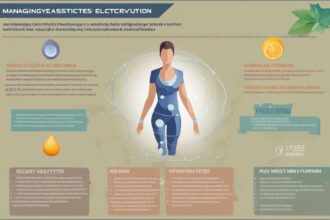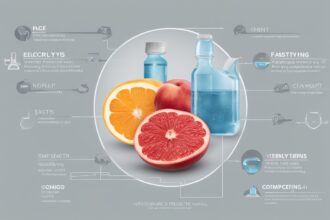Embarking on a fasting journey, whether it’s intermittent fasting, extended fasting, or a water fast, can be a transformative experience for your health and well-being. However, one critical aspect often overlooked is the role of electrolytes during fasting. These tiny charged particles are essential for maintaining bodily functions, especially when you’re abstaining from food. Without proper attention to electrolytes fasting balance, you might encounter fatigue, headaches, or even more severe symptoms like muscle cramps. In this detailed guide, I’ll walk you through what electrolytes are, why they matter during fasting, and how to ensure you’re getting enough to support your goals. Let’s dive into the science and practical tips to keep you energized and healthy throughout your fasting practice.
What Are Electrolytes and Why Do They Matter?
Electrolytes are minerals in your body that carry an electric charge, playing a vital role in regulating numerous physiological processes. Key electrolytes include sodium, potassium, magnesium, calcium, chloride, and bicarbonate. They help maintain fluid balance, nerve signaling, and muscle function, which are all critical for day-to-day health (Institute of Medicine, 2005). When you’re fasting, your body isn’t receiving these minerals through food, and water alone often isn’t enough to replenish them. This can lead to an imbalance, especially during prolonged fasts, where symptoms like dizziness or lethargy might creep in. Understanding the importance of electrolytes fasting balance is the first step to a successful fasting experience.
How Fasting Impacts Electrolyte Levels
When you fast, your body undergoes significant metabolic shifts. Without food intake, insulin levels drop, and your body starts burning stored glycogen for energy. This process releases water and depletes electrolytes like sodium and potassium, which are often stored with glycogen (Kerndt et al., 1982). Additionally, during fasting, your kidneys excrete more sodium and water, a phenomenon sometimes called the “natriuresis of fasting.” If you’re not mindful of replenishing these fasting electrolytes, you might experience symptoms of deficiency, such as headaches, irritability, or even heart palpitations in extreme cases. Staying proactive about maintaining electrolyte levels can make all the difference in how you feel during a fast.
Common Symptoms of Electrolyte Imbalance During Fasting
Noticing the signs of an electrolyte imbalance early can help you take action before things escalate. When your body lacks essential minerals during a fast, it can manifest in various ways. Here are some common symptoms to watch out for:
- Fatigue or weakness, often due to low potassium or magnesium levels.
- Muscle cramps or spasms, which can signal a sodium or calcium deficiency.
- Headaches and dizziness, frequently linked to dehydration and low sodium (Popkin et al., 2010).
- Irritability or brain fog, sometimes caused by an imbalance in magnesium.
If you experience any of these during your fast, it might be time to reassess your electrolytes fasting strategy. Don’t ignore these signals—your body is trying to tell you something important.
Practical Ways to Maintain Electrolyte Balance While Fasting
Keeping your electrolyte levels in check during a fast doesn’t have to be complicated. With a few simple strategies, you can support your body and avoid the pitfalls of deficiency. Here are some actionable tips to integrate into your fasting routine:
- Add a pinch of high-quality salt to your water: Himalayan or sea salt can provide sodium and trace minerals to combat depletion.
- Consider electrolyte supplements: Look for sugar-free options with a balance of sodium, potassium, and magnesium.
- Drink bone broth (if allowed in your fast): It’s a natural source of sodium and other minerals, perfect for shorter fasting windows.
- Stay hydrated with mineral water: Some brands naturally contain trace electrolytes to support your balance.
- Monitor your symptoms: Keep a journal to track how you feel and adjust your fasting electrolytes intake as needed.
These small adjustments can significantly enhance your fasting experience, helping you feel more energized and focused. Remember, everyone’s body is different, so experiment to find what works best for you.
The Science Behind Electrolytes and Fasting Performance
Research shows that maintaining proper electrolyte balance during fasting isn’t just about avoiding discomfort—it can also optimize your body’s performance. Sodium, for instance, is crucial for maintaining blood volume and pressure, which can dip during fasting due to reduced fluid intake (Adrogue & Madias, 2000). Potassium helps regulate heart function and muscle contractions, preventing dangerous arrhythmias in extreme deficiencies (Gennari, 1998). Magnesium, often called the “relaxation mineral,” supports over 300 biochemical reactions, including energy production, which can be strained during fasting (de Baaij et al., 2015). By prioritizing electrolytes during fasting, you’re not only safeguarding your health but also supporting your body’s ability to adapt to the stress of fasting.
To dive deeper into the evidence, let’s look at a couple of relevant studies that highlight the importance of electrolytes during fasting or calorie restriction. These findings underscore why paying attention to fasting electrolytes is non-negotiable for both safety and efficacy.
Studies on Electrolytes and Fasting: A study published in the American Journal of Clinical Nutrition explored the effects of fasting on electrolyte excretion in healthy adults. The researchers found that during the initial days of fasting, urinary sodium and potassium excretion increased significantly, leading to potential deficiencies if not addressed. They emphasized the importance of supplementation or dietary strategies to mitigate these losses, especially during prolonged fasts (Stewart & Fleming, 1973). Another study in the Journal of Applied Physiology examined the impact of dehydration and electrolyte imbalance during fasting-like conditions. The results indicated that even mild imbalances could impair physical performance and cognitive function, reinforcing the need for proactive electrolyte management (Sawka et al., 2007). These studies collectively highlight that maintaining electrolyte balance isn’t just a comfort measure—it’s a critical component of a safe fasting practice.
Who Needs to Be Extra Cautious with Electrolytes During Fasting?
While everyone should pay attention to electrolytes fasting balance, certain groups are at higher risk of imbalances and need to take extra precautions. If you fall into any of these categories, consult with a healthcare provider before starting a fasting regimen, especially if it’s extended. Those with pre-existing conditions like kidney disease or hypertension may need tailored advice, as electrolyte shifts can exacerbate these issues (Kovesdy, 2017). Additionally, if you’re on medications like diuretics, which increase electrolyte excretion, fasting could amplify the risk of deficiency. Athletes or individuals engaging in intense physical activity during fasting also lose more electrolytes through sweat and should be diligent about replenishment. Always prioritize safety and listen to your body’s cues when navigating fasting and electrolytes.
In wrapping up, it’s clear that electrolytes play a starring role in a successful fasting journey. By understanding how fasting impacts your body’s mineral balance and taking proactive steps to maintain electrolytes during fasting, you can avoid common pitfalls and enhance your overall experience. Whether it’s sipping on salted water, using a trusted supplement, or simply tuning into how you feel, small actions can yield big results. Fasting is a powerful tool for health, but it’s not without its challenges—equipping yourself with knowledge about fasting electrolytes ensures you’re set up for success. So, as you embark on or continue your fasting practice, keep electrolytes at the forefront of your strategy, and watch how your body thanks you for it.
References
- Adrogue, H. J., & Madias, N. E. (2000). Sodium and potassium in the pathogenesis of hypertension. New England Journal of Medicine, 342(18), 1336-1345.
- de Baaij, J. H., Hoenderop, J. G., & Bindels, R. J. (2015). Magnesium in man: Implications for health and disease. Physiological Reviews, 95(1), 1-46.
- Gennari, F. J. (1998). Hypokalemia. New England Journal of Medicine, 339(7), 451-458.
- Institute of Medicine. (2005). Dietary Reference Intakes for Water, Potassium, Sodium, Chloride, and Sulfate. National Academies Press.
- Kerndt, P. R., Naughton, J. L., Driscoll, C. E., & Loxterkamp, D. A. (1982). Fasting: The history, pathophysiology and complications. Western Journal of Medicine, 137(5), 379-399.
- Kovesdy, C. P. (2017). Updates in hyperkalemia: Outcomes and therapeutic strategies. Reviews in Endocrine and Metabolic Disorders, 18(1), 41-47.
- Popkin, B. M., D’Anci, K. E., & Rosenberg, I. H. (2010). Water, hydration, and health. Nutrition Reviews, 68(8), 439-458.
- Sawka, M. N., Burke, L. M., Eichner, E. R., Maughan, R. J., Montain, S. J., & Stachenfeld, N. S. (2007). American College of Sports Medicine position stand: Exercise and fluid replacement. Journal of Applied Physiology, 39(2), 377-390.
- Stewart, W. K., & Fleming, L. W. (1973). Features of a successful therapeutic fast of 382 days’ duration. American Journal of Clinical Nutrition, 26(6), 613-625.






